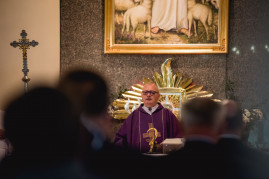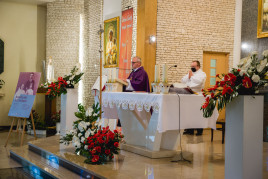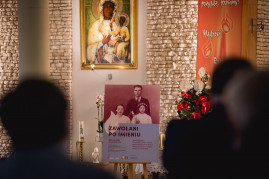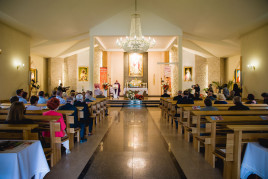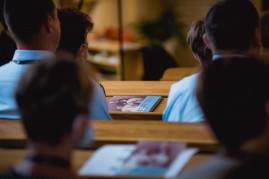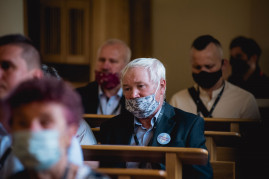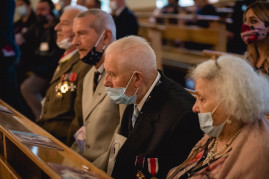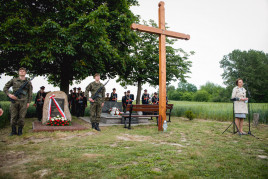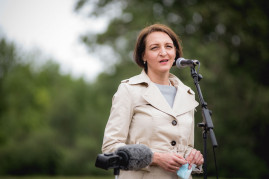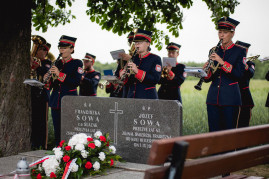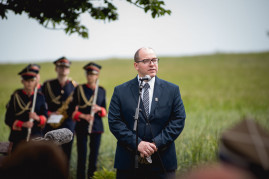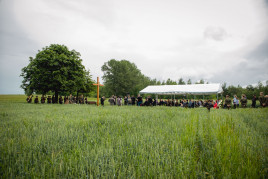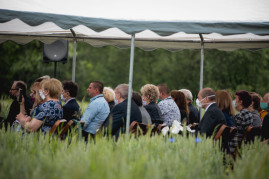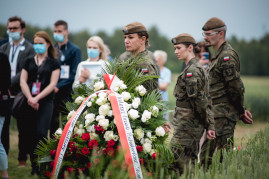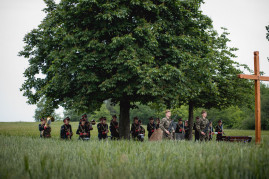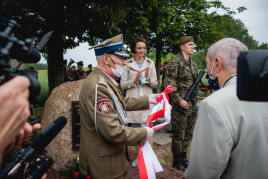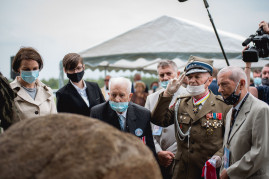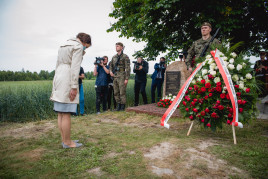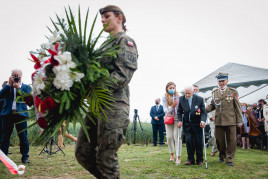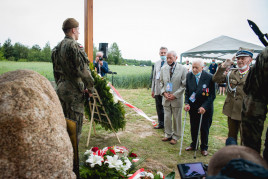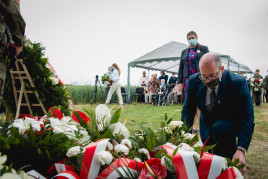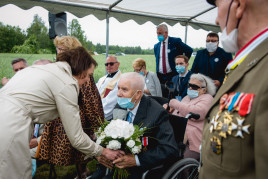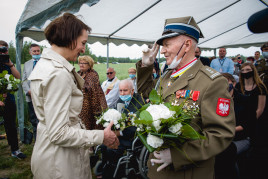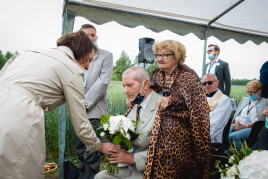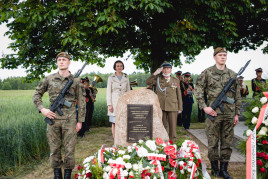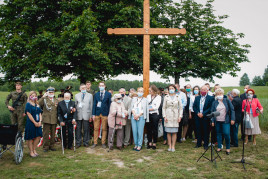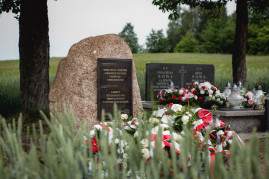Franciszka and Józef Sowa commemorated in Wierzchowisko - Instytut Pileckiego
Franciszka and Józef Sowa commemorated in Wierzchowisko
We commemorated a family who helped a group of Jews escape from the Częstochowa ghetto and gave them shelter. After finding the hiding place, the Germans murdered both the rescued and the rescuers. Franciszka and Józef Sowa orphaned five children.
The whole family went to the rescue
Józef and Franciszka Sowa were farmers in the village of Wierzchowisko near Częstochowa. They had five children: Eugeniusz, Irena, Józef, Janina and Piotr. In the summer of 1942, Józef and his son Eugeniusz built an underground hiding place in their barn, the entrance to which was located beneath the feeding trough for the horses. It provided shelter to people whom Józef had helped to escape from the Częstochowa ghetto: Henryk (Hersz) Cukrowski and his wife, the goldsmith Marian Cukrowski, the tailor Leon (whose last name remains unknown), and the teacher Pola. It is possible that as many as seven people of Jewish origin were hiding there. Even the children helped by smuggling food across the nearby border with territories annexed into the Reich. Twice they were caught and beaten by German soldiers. For about a year they managed to protect the people they were hiding.
“German soldiers came to the Sowa property before dawn on 1 September 1943. They banged on the windows until they cracked. Józef came out of the house. He was immediately hit in the head with a rifle butt and lost consciousness. The Germans dragged other family members out of their beds. They started to beat the pregnant Franciszka, who fainted several times. But they did not get an answer to the question where the Jews and partisans were,” said Agnieszka Dąbek, the academic coordinator of the Pilecki Institute’s project. “So they started to search the buildings. They threatened that if the Sowas did not reveal where the fugitives were hiding, they would all be shot. Taking advantage of a moment of inattention, Franciszka called her daughters and started to flee with two-year-old Piotr in her arms. The girls managed to hide in the woods, while the mother hid in the root cellar at the house of a neighbor, Józef Kalisz. The gendarmes immediately ran after her, seized her by the hair, and brought her back,” Agnieszka Dąbek added.
The people found in the shelter were stood beneath the trees along with Franciszka and Józef. At that time, Eugeniusz and Józef were sitting in a German car. They saw the execution through the window: military policemen stood in front of the people standing in line and fired their shots on cue. Then they finished off those who had survived the salvo. The Sowas’ farm buildings were looted and burned.
The orphaned children were separated. They were looked after by their uncle Stanisław Sowa, but despite the objections of their relatives, eight-year-old Janina was taken away by a German family who raised her as their daughter. The siblings had no contact with Janina until 1963, when she was found in Hannover. She lived under a changed name and was Germanized. She did not remember where she came from.
Commemoration in Wierzchowisko
The commemoration of Franciszka and Józef Sowa as part of the “Called by Name” project began with Holy Mass in the Church of Jesus Christ the Good Shepherd in Wierzchowisko, celebrated by Rev. Marek Augustyn Jachna.
During the ceremony, Eugeniusz Sowa, son of the victims, spoke on behalf of the entire family: “A cruel tragedy came to pass; our parents paid the highest price for their efforts. As orphaned children, we later suffered great pain, a lack of help from society and further persecution during forced labor in Germany. After the war, the heroic deed of our parents remained alive only in our memories. For others, it faded away amongst the enormity of the victims of the war. And yet our parents demonstrated the highest degree of humanity. Their behavior represented the ideals that should guide each of us at all times, regardless of war or peace. Today, 77 years later, the day has come to recall the memory of our parents and their noble deed.”
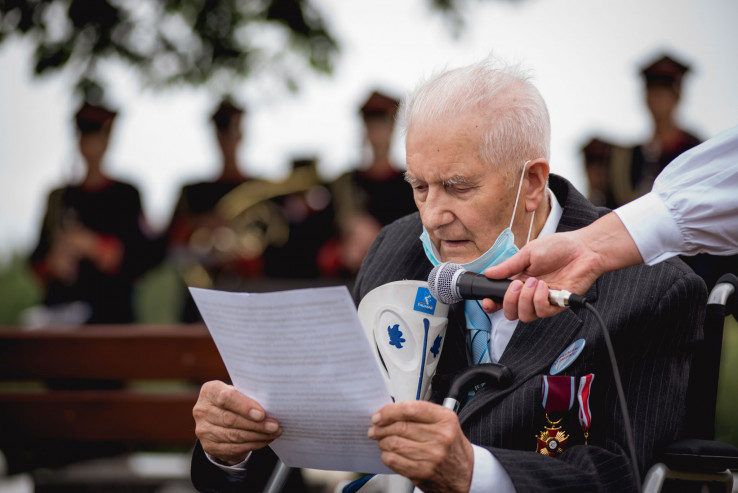
During the unveiling of the plaque mounted on a stone standing next to the grave, Deputy Minister of Culture and National Heritage Prof. Magdalena Gawin, the initiator of the “Called by Name” project, appealed to the local community: “I would very much like this commemoration not to be the end, but the beginning of something good. Remember local heroes. Try to teach your children about the events in their hometowns. Three sons are with us now. Thank you for cherishing the memory of your parents.”
All those gathered observed a minute of silence in memory of Franciszka and Józef Sowa, Henryk Cukrowski and his wife, Marian Cukrowski, the tailor Leon (whose surname remains unknown), the teacher Pola, and all other Polish citizens, Jews and Poles alike, who were murdered during the German occupation.
The event was co-organized by the Pilecki Institute, headed by Dr. Wojciech Kozłowski and Anna Gutkowska, in addition to the Częstochowa starost, Krzysztof Smela, and the head of the Mykanów commune, Dariusz Pomada.
